Nikhil Prasad Fact checked by:Thailand Medical News Team May 09, 2025 9 months, 4 days, 22 hours, 13 minutes ago
Medical News: Scientists from Georgia State University-USA have uncovered new insights into why some people develop severe lung complications or long COVID after a SARS-CoV-2 infection. The culprit may be a little-known but powerful immune-related gene called ZBP1, which appears to play a double-edged role in how the body reacts to the virus.
 The Hidden Gene That Might Be Driving Long COVID and Severe Lung Damage
The Hidden Gene That Might Be Driving Long COVID and Severe Lung Damage
This breakthrough discovery, based on advanced genetic studies using infected mice, reveals that ZBP1 is heavily activated during infection by multiple COVID-19 variants and is a central driver of lung inflammation, tissue destruction, and immune system overreaction. The findings are raising hopes that future treatments targeting ZBP1 might help prevent life-threatening COVID outcomes and reduce the long-term consequences of the disease.
This
Medical News report is based on an extensive study conducted by researchers from the Department of Biology and the Center for Diagnostics and Therapeutics at Georgia State University in Atlanta, United States. The team examined how various SARS-CoV-2 variants—including the original Wuhan strain, Alpha, Beta, Delta, Omicron, and a laboratory-adapted version called MA10—interacted with ZBP1 and triggered gene activity in the lungs.
ZBP1 May Help Clear the Virus but at a High Cost
The ZBP1 gene, short for Z-DNA-binding protein 1, acts as a sensor inside cells that detects viral genetic material. It helps launch an immune defense by activating inflammation and triggering cell death to eliminate infected cells. However, the researchers discovered that this process can spiral out of control.
In infected mice with a normal ZBP1 gene, the lungs were flooded with proinflammatory molecules, immune cell infiltration, and large-scale cell death. These are the same damaging responses seen in patients suffering from severe COVID-19 pneumonia and even post-acute COVID symptoms.
Strikingly, when scientists used mice genetically modified to lack the ZBP1 gene, the results were dramatically different. These mice showed less lung inflammation, fewer dying cells, lower viral loads in some cases, and reduced levels of harmful cytokines such as TNF-alpha and IL-18—suggesting that blocking ZBP1 could significantly reduce COVID-related lung damage.
Severe Reactions Seen with Alpha, Beta, and Delta Variants
Although all SARS-CoV-2 variants tested activated ZBP1 to some extent, the most intense immune and genetic responses were linked to the Alpha, Beta, Delta, and MA10 strains. These variants triggered the highest number of differentially expressed genes (DEGs) related to inflammation, interferon signaling, and antigen presentation.
One group of genes, including Cxcl10, Isg15, Rsad2, and Irf7, was consistently upregulated in all variants, reflecting a shared immune signature. But Omicron, despite its high mutation count, induced a markedly milder response, which supports real-world data showing it causes less severe disease in many people.
<
br />
ZBP1 itself was found to be highly expressed in the lungs at early stages of infection—especially in Alpha-infected mice—with a peak activation at day 3 post-infection. This peak coincided with strong inflammation and markers of PANoptosis, a destructive immune cell death process involving pyroptosis, necroptosis, and apoptosis.
How ZBP1 May Be Fueling Long COVID
The findings also point to a possible role for ZBP1 in long COVID. Researchers observed that the inflammatory response driven by ZBP1 persisted even after viral loads began to decline. In other words, the immune system remained hyperactive even when the virus was no longer actively replicating, a pattern that mirrors what doctors have observed in long COVID patients.
In particular, the prolonged expression of interferon-related genes, the activation of inflammasome pathways, and the presence of macrophage infiltration in lung tissue may explain why some individuals continue to experience fatigue, breathing issues, brain fog, and chest pain weeks or months after infection.
Importantly, mice lacking ZBP1 not only recovered faster but also produced higher levels of anti-inflammatory molecules like IL-2 and IL-4, suggesting a more balanced immune response that could help in resolving inflammation without lasting tissue damage.
Targeting ZBP1 Could Be the Future of COVID Treatment
The authors of the study believe that ZBP1 could be a therapeutic target for future COVID drugs. By dampening or modulating its activity, it may be possible to prevent excessive lung inflammation without compromising the immune system’s ability to fight off the virus.
These new insights are especially important as scientists continue to search for effective treatments for long COVID and post-viral syndromes. Unlike vaccines or antivirals that target the virus itself, ZBP1-based interventions would focus on the host immune response, making them potentially useful across different virus variants and even future coronavirus outbreaks.
Conclusions
The Georgia State University team has revealed a powerful connection between ZBP1 and the severity of COVID-related lung damage and prolonged immune response. While this gene is crucial for fighting viral infections, its overactivation may be the missing link behind the uncontrolled inflammation seen in acute and long COVID. This discovery not only adds a vital piece to the COVID-19 puzzle but also opens new doors for therapeutic development.
If these findings are confirmed in human studies, we could soon see treatments aimed at regulating ZBP1 as a way to prevent complications, speed up recovery, and reduce the burden of long COVID. By understanding and carefully managing our own immune response, we may finally have a way to minimize the long-term damage caused by the coronavirus.
The study findings were published in the peer reviewed journal: Frontiers in Immunology.
https://www.frontiersin.org/journals/immunology/articles/10.3389/fimmu.2025.1557535/full
For the latest COVID-19 News, keep on logging to Thailand
Medical News.
Read Also:
https://www.thailandmedical.news/news/covid-19-news-sars-cov-2-orf8-forms-intracellular-aggregates,-inhibiting-ifn-induced-antiviral-gene-expression-in-lung-epithelial-cells
https://www.thailandmedical.news/news/sars-cov-2-orf8-protein-forms-intracellular-aggregates-and-disrupts-lung-cell-immunity
https://www.thailandmedical.news/news/covid-19-causes-the-upregulation-of-neuroinflammation-associated-genes-in-the-brain
https://www.thailandmedical.news/articles/coronavirus
https://www.thailandmedical.news/pages/thailand_doctors_listings
